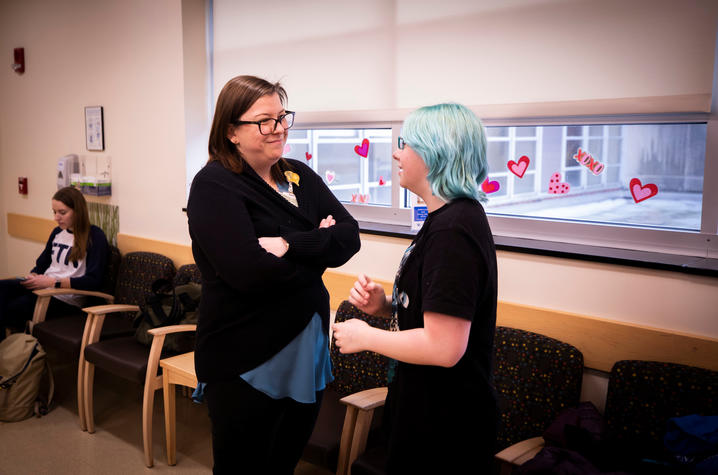UK Experts Weigh In on Trends That Will Define the Decade: Adolescent Cancer Care

LEXINGTON, Ky. (March 17, 2020) – The year 2020 kicks off a new decade. What will the next 10 years bring in the areas of health, technology, climate, the economy, politics and more? In a new recurring series, UKNow explores the next decade by asking University of Kentucky experts to discuss and predict upcoming trends in their areas.
Today, we spoke with Caryn Sorge, medical director for the Adolescent and Young Adult (AYA) program in the DanceBlue Kentucky Children's Hospital Hemotology/Oncology Clinic.
UKNow: What are you watching for or predicting in the coming decade that you think will be of interest of importance in the area?
Sorge: My hope is for this program to contribute to the advancement in science and treatment of this patient population by increasing enrollment on clinical trials. By increasing enrollment we are able to learn more about the unique disease process and hopefully improve outcomes for these patients. As members of national treatment consortiums we are able to actively enroll patients in clinical trials that allow our patients access to novel therapies that they may not otherwise have access to.
UKNow: What does UK contribute to this space?
Sorge: Through the AYA program my hope is that we are providing a more comprehensive approach to the patient and their family. By doing so, we are increasing access to care by providing the support necessary to enable them to overcome barriers that have historically impacted outcomes for this population.
UKNow: What is something or some trend you are optimistic about? And what is something you are concerned with?
Sorge: I am optimistic to see the advancements that have been made in the field of oncofertility nationally, in both the science but also the recognition of its importance to the patient.
Sadly, Kentucky is currently in the top 5 in the nation for cancer incidence and mortality for this age range and my hope is that this program will help push the science forward and ultimately improve outcomes for this patient population, in not only the Commonwealth but the nation.
UKNow: What will be the impact of these trends, in your judgment, on Kentucky? The country? The world?
Sorge: I am optimistic to see the advancements that have been made in the field of oncofertility nationally, in both the science but also the recognition of its importance to the patient. Oncofertility is a vital part of oncology care and unfortunately, historically, there have been limited options available to patients for various reasons. There is a national movement to provide more options and education for patients. Here at UK we have an entire team dedicated to providing education and services to all of our oncology patients.
As the state’s flagship, land-grant institution, the University of Kentucky exists to advance the Commonwealth. We do that by preparing the next generation of leaders — placing students at the heart of everything we do — and transforming the lives of Kentuckians through education, research and creative work, service and health care. We pride ourselves on being a catalyst for breakthroughs and a force for healing, a place where ingenuity unfolds. It's all made possible by our people — visionaries, disruptors and pioneers — who make up 200 academic programs, a $476.5 million research and development enterprise and a world-class medical center, all on one campus.




